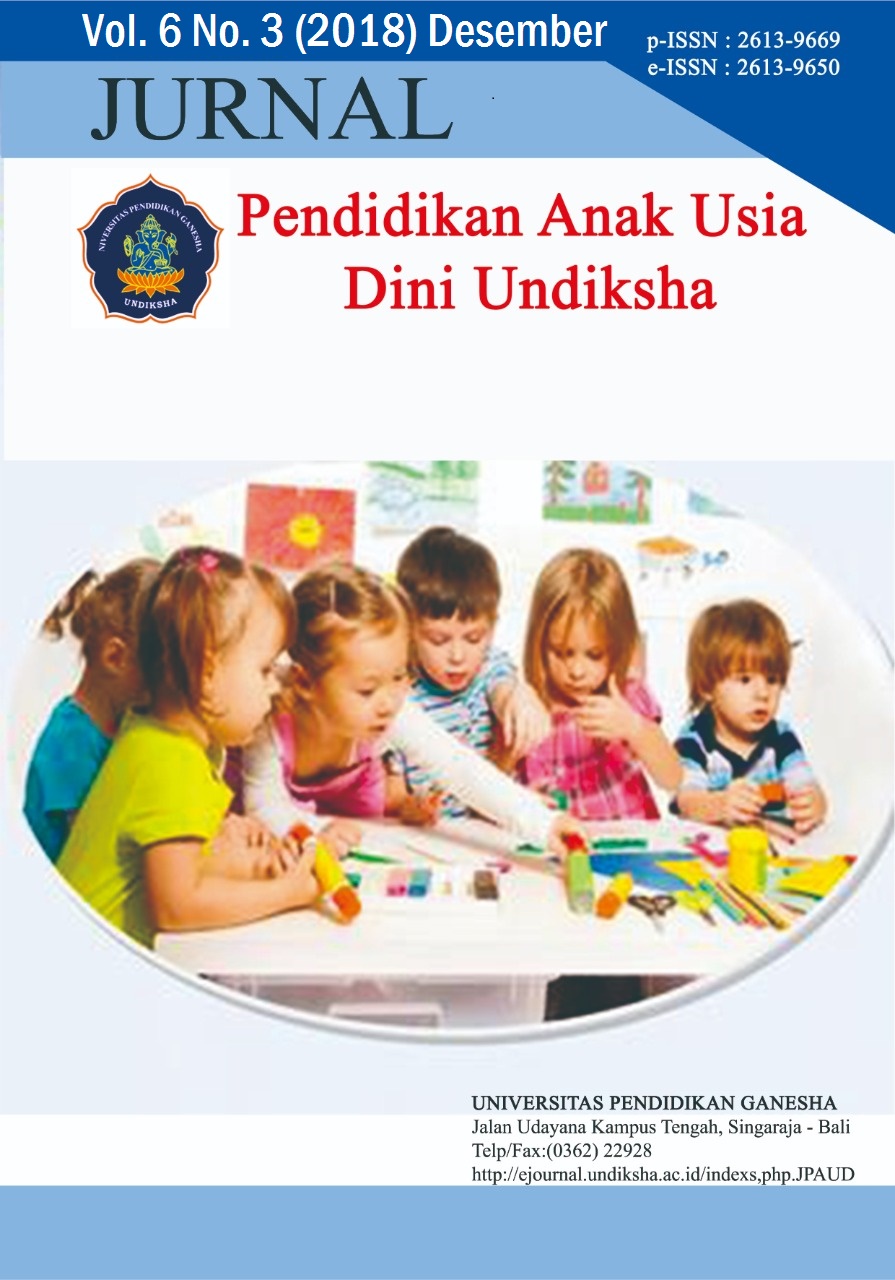Pengaruh Metode Proyek Terhadap Kemampuan Sosial Pada Anak Kelompok B Di TK Gugus III Kecamatan Tampaksiring Tahun Ajaran 2017/2018
DOI:
https://doi.org/10.23887/paud.v6i1.15188Abstract
Penelitian ini bertujuan untuk mengetahui pengaruh metode proyek terhadap kemampuan sosial anak. Kemampuan sosial adalah anak belajar berinterkasi dengan orang lain. Sedangkan metode proyek merupakan merupakan salah satu metode pembelajaran yang bisa membangkitkan keaktifan peserta didik, anak dapat memecahkan masalah yang diberikan oleh gurunya. Jenis penelitian yang digunakan yaitu eksperimen semu dengan nonequivalent control group design. Populasi dalam penelitian ini adalah seluruh anak kelompok B1 semester genap di Gugus III Kecamatan Tampaksiring berjumlah 109 orang. Sampel penelitian yaitu 31 anak kelompok B1 TK Soma Negara sebagai kelompok eksperimen dan 29 anak kelompok B1 TK Ratna Kumara sebagai kelompok kontrol. Data kemampuan sosial anak dikumpulkan dengan instrumen non tes melalui observasi , ceklis. Data yang terkumpul dianalisis menggunakan uji-t. Berdasarkan hasil analisis data, diperoleh thitung = 5,22. Pada taraf signifikansi 5% dengan dk 58 diperoleh ttabel = 2,00. Hal ini berarti bahwa thitung>ttabel, se¬hingga dapat diinterprestasikan bahwa terdapat perbedaan kemampuan sosial yang signifikan antara kelompok eksperimen dan kelompok control yang mengikuti pembelajaran menggunakan metode proyek dan kelompok yang tidak dibelajarkan dengan metode proyek. Dilihat dari nilai rata-rata kemampuan sosial kelompok eksperimen adalah 76,67 lebih besar dari rata-rata kemampuan sosial kelompok kontrol yang hasil rata-ratanya sebesar 66,27. Dengan demikian dapat disimpulkan bahwa pembelajaran menggunakan metode proyek berpengaruh terhadap kemampuan sosial siswa pada anak kelompok B di TK Gugus III Kecamatan Tampaksiring Tahun Ajaran 2017/2018.Kata Kunci : Metode Proyek, kemampuan sosial, anak usia dini
This study aims to determine the effect of project methods on children's social skills. Social skills are children learning to interact with others. While the project method is one of the learning methods that can generate the learner's activity, the child can solve the problem given by the teacher. The type of research used is quasi experiment with nonequivalent control group design. The population in this study is all children of group B1 even semester in Group III Tampaksiring District amounted to 109 people. The samples were 31 children of B1 TK Soma Negara group as experiment group and 29 children of B1 TK Ratna Kumara group as control group. Child social ability data collected by non test instrument through observation, checklist. The collected data were analyzed using the t-test. Based on the data analysis, obtained t count = 5.22. At the level of significance of 5% with dk 58 obtained ttable = 2.00. This means that thitung> ttable, so it can be interpreted that there are significant differences in social capability between the experimental group and the control group following the lesson using project and group methods not taught by the project method. Judging from the average score of social ability of the experimental group is 76.67 is greater than the average social ability of the control group whose average result is 66.27. Thus it can be concluded that the learning using project method affect the social ability of students in children group B in kindergarten class III Tampaksiring District School Year 2017/2018.
keyword : Project method, social skills, early childhood
Published
2018-07-26
How to Cite
., N. P. S. E. P., ., L. A. T. S., & ., D. N. N. G. M. (2018). Pengaruh Metode Proyek Terhadap Kemampuan Sosial Pada Anak Kelompok B Di TK Gugus III Kecamatan Tampaksiring Tahun Ajaran 2017/2018. Jurnal Pendidikan Anak Usia Dini Undiksha, 6(3), 303–312. https://doi.org/10.23887/paud.v6i1.15188
Issue
Section
Articles
License
Authors who publish with the Jurnal Pendidikan Anak Usia Dini Undiksha agree to the following terms:
- Authors retain copyright and grant the journal the right of first publication with the work simultaneously licensed under a Creative Commons Attribution License (CC BY-SA 4.0) that allows others to share the work with an acknowledgment of the work's authorship and initial publication in this journal.
- Authors are able to enter into separate, additional contractual arrangements for the non-exclusive distribution of the journal's published version of the work (e.g., post it to an institutional repository or publish it in a book), with an acknowledgment of its initial publication in this journal.
- Authors are permitted and encouraged to post their work online (e.g., in institutional repositories or on their website) prior to and during the submission process, as it can lead to productive exchanges, as well as earlier and greater citation of published work. (See The Effect of Open Access)











